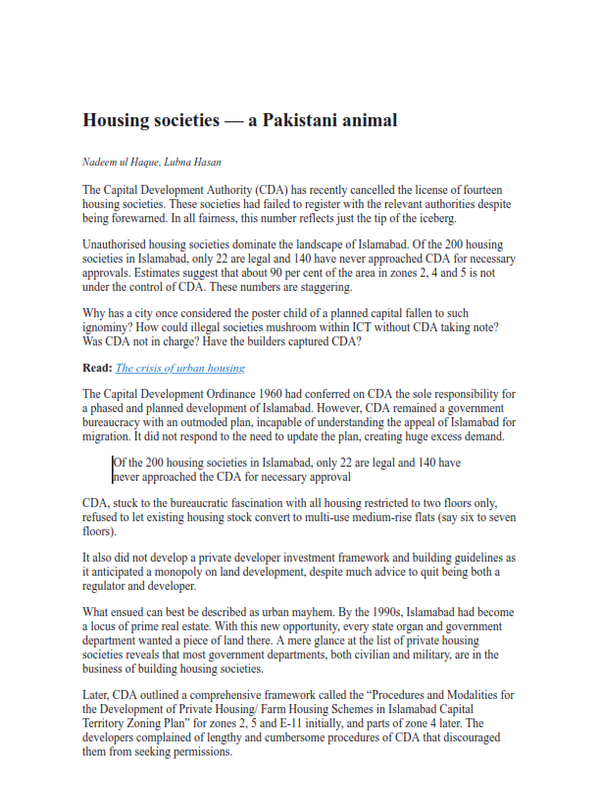Housing societies — a Pakistani animal (Dawn)
The Capital Development Authority (CDA) has recently cancelled the license of fourteen housing societies. These societies had failed to register with the relevant authorities despite being forewarned. In all fairness, this number reflects just the tip of the iceberg.
Unauthorised housing societies dominate the landscape of Islamabad. Of the 200 housing societies in Islamabad, only 22 are legal and 140 have never approached CDA for necessary approvals. Estimates suggest that about 90 per cent of the area in zones 2, 4 and 5 is not under the control of CDA. These numbers are staggering.
Why has a city once considered the poster child of a planned capital fallen to such ignominy? How could illegal societies mushroom within ICT without CDA taking note? Was CDA not in charge? Have the builders captured CDA?
The Capital Development Ordinance 1960 had conferred on CDA the sole responsibility for a phased and planned development of Islamabad. However, CDA remained a government bureaucracy with an outmoded plan, incapable of understanding the appeal of Islamabad for migration. It did not respond to the need to update the plan, creating huge excess demand.
Of the 200 housing societies in Islamabad, only 22 are legal and 140 have never approached the CDA for necessary approval
CDA, stuck to the bureaucratic fascination with all housing restricted to two floors only, refused to let existing housing stock convert to multi-use medium-rise flats (say six to seven floors).
It also did not develop a private developer investment framework and building guidelines as it anticipated a monopoly on land development, despite much advice to quit being both a regulator and developer.
What ensued can best be described as urban mayhem. By the 1990s, Islamabad had become a locus of prime real estate. With this new opportunity, every state organ and government department wanted a piece of land there. A mere glance at the list of private housing societies reveals that most government departments, both civilian and military, are in the business of building housing societies.
Later, CDA outlined a comprehensive framework called the “Procedures and Modalities for the Development of Private Housing/ Farm Housing Schemes in Islamabad Capital Territory Zoning Plan” for zones 2, 5 and E-11 initially, and parts of zone 4 later. The developers complained of lengthy and cumbersome procedures of CDA that discouraged them from seeking permissions.
It takes CDA an average of two and half years to grant a no objection certificate (NOC), with a maximum of up to nine and half years in one case. The authority has issued only 22 NOCs and 24 letters of permission (LOPs) in the last 30 years.
The developers, too, did not shy away from gaming the system. They are notorious for over-selling plots, having fictitious land ownership records, and not completing the development work in time. These societies take decades to develop. The average time for development work to complete is 12 years, extending to more than two decades in many cases.
All government departments, agencies and universities have used the cooperative society law to develop land sporadically and haphazardly for decades. These developments take years to materialise, shortchange investors and allow the powerful in each agency and country to benefit. They have also been the source of many scams. Yet seldom are they discussed or understood!
CDA has little capacity to monitor these irregularities. An audit of CDA in 2017 found it was involved in many activities, including the issuance of NOCs on fake and fictitious documents and non-cancellation of NOC even after a notice from the National Accountability Bureau. There was also a lack of action against non-completion of projects within the stipulated period, not selling 30 per cent of the mortgaged area when societies do not complete development work, not obtaining bank guarantees and extending undue benefit to the sponsors. CDA has not issued a completion certificate in the past 25 years, found the audit.
The total area of the three Zones (2, 4 and 5) is 1,352,360 kanals. Housing societies had obtained NOCs for an area of 91,611 kanals only (6.8pc of the total area), and the remaining 1.26m kanals (93.2pc) were illegal, revealed the audit report. This 1.26m kanals of illegal land is sold by land grabbers under the name of different illegal societies.
About 99pc of these illegal societies are not completed. People are looted of their hard-earned money to the tune of Rs5.2 trillion.
Housing society and land development remain a scam in Pakistan largely because regulators and administrators benefit from this approach with free plots to the powerful. In turn, the gifting of plots leads to the capture of regulation and other agencies of governance.
As the Pakistan Institute of Development Economics has been lamenting, Pakistan has become a Plotistan with sprawling, unmanageable, highly polluted cities. It is time we deeply reviewed our urban development models, freeing them from scams and wasteful activities, timewise and land-wise.
Rather than sprawls, we should be facilitating apartment living. Rather than land development, focus on construction should be the basis of real estate.
Let development be an industry with clear, enforceable time-bound contracts between bankable and credible builders, not dodgy people who hide behind societies and their powerful plot recipients. We should seek rapid development rather than money locked up in a possible land development over a 30-year horizon.
Mr Haque is a former deputy chairman Planning Commission and Vice-Chancellor of PIDE.
He tweets @nadeemhaque.
Ms Hassan is a senior research economist at PIDE
Published in Dawn, The Business and Finance Weekly, September 26th, 2022




